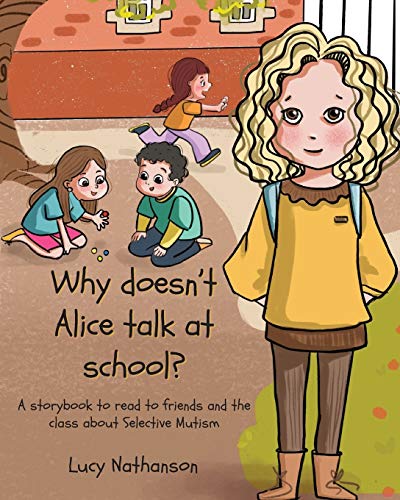Why doesn't Alice talk at school?
A storybook to read to friends and the class about Selective Mutism
Lucy Nathanson
BOOK REVIEW

In the heart of every classroom lies the echoes of laughter, the chatter of curious minds, and sometimes, the deafening silence of a child who simply cannot speak. Why doesn't Alice talk at school? is not just a storybook; it's a poignant exploration of selective mutism that resonates deeply with both children and adults. Lucy Nathanson masterfully crafts a narrative that urges empathy and understanding, transforming what could easily be an overlooked condition into a powerful, relatable experience.
This 46-page gem is more than a mere educational tool; it's a heartfelt invitation to engage in a conversation that is far too often shrouded in stigma and misunderstanding. The protagonist, Alice, personifies the silent struggle many children face when confronted with the bustling, overwhelming environment of a school. Through Alice's eyes, we dive into a world where words become shackles, binding her to a place of isolation despite being surrounded by peers. As Nathanson unfolds Alice's journey, she paints a vivid picture of the emotional turmoil that selective mutism can bring-not just to the child but to their classmates, teachers, and families.
Readers have noted how the book evokes a spectrum of emotions. Some have described it as a balm for those who have felt marginalized, offering a voice to the voiceless. Critics have lauded the simplicity yet depth of Nathanson's storytelling. The prose is accessible, yet it carries an emotional weight that can leave you pondering well after the last page is turned. The illustrations complement the text beautifully, depicting not only Alice's solitude but also the warmth and encouragement she receives from those around her, making readers feel part of her world.
It's essential to highlight the broader context in which this book enters our cultural conversation. Selective mutism, though less recognized than other childhood challenges, affects a significant number of children. In a world that often emphasizes verbal communication as a measure of intelligence and social capability, Why doesn't Alice talk at school? challenges societal norms and pushes us to reconsider how we view communication. It compels us to ask why we, as a society, are often so quick to label silence as a deficiency instead of recognizing it as a unique form of expression.
Moreover, the conversations stemming from this book can lead to real-life changes. Parents and educators have expressed gratitude for Nathanson's insights, reporting that the story opens doors for discussions about anxiety, mental health, and the importance of compassion in our interactions with others. There is a movement that Alice inspires-a movement toward inclusivity, where every child feels valued, regardless of how they communicate.
As you delve into the tale, consider how it reflects your own experiences or those of loved ones. The nuances of Alice's journey could represent a friend's struggle or perhaps even a conflict you face in your own life. The urgency isn't just to read the book but to integrate its lessons into our everyday interactions-promoting awareness about selective mutism and fostering an environment where every child is encouraged to express themselves, irrespective of the form that may take.
In short, Why doesn't Alice talk at school? is a catalyst for change, urging us to dismantle the walls of silence around selective mutism. It pushes boundaries, urging readers to redefine what it means to communicate. The story plays out robustly, not just as a narrative but as a movement-a call to celebrate diversity in voices and a reminder that sometimes, silence speaks louder than words.
Don't miss the chance to immerse yourself in this transformative work that will surely reshape how you perceive communication and connection in our modern world. This is a story that stays with you, urging reflection and a deeper understanding of the silent struggles many endure. Alice has a voice, and it may just inspire you to listen. 🌟
📖 Why doesn't Alice talk at school?: A storybook to read to friends and the class about Selective Mutism
✍ by Lucy Nathanson
🧾 46 pages
2019
#doesnt #alice #talk #school #storybook #read #friends #class #about #selective #mutism #lucy #nathanson #LucyNathanson